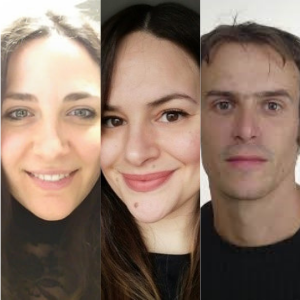Overcoming self/other affective boundaries: CHBH & IMH Workshop
- Dates
- Friday 4 December 2020 (13:00-15:00)

Seminars are free to attend and are open to all, both within and outside the University.
Please register your interest to attend using the link above.
We are pleased to announce that the CHBH and IMH will hold a joint Outreach Workshop on Friday, 4th December 13:00-15:00 GMT, featuring talks from Dr Federica Meconi, University of Birmingham; Professor Jeroen Vaes, University of Trento, and Dr Laura Crucianelli, Karolinska Institutet, details of the talks and biographies can be found below.
Overcoming affective boundaries between the self and the other: perspectives on interpersonal interactions
Join international experts in a series of workshops discussing how we build bridges between the self and the other. Discover the ability at the basis of social interactions – empathy – and how it varies: from physical features to shared past experiences. Delegates can hear about our ability to read others’ mind and how denial of a mind changes the way in which we interact with somebody that we perceive as something. Discussion will then focus on the central role of interpersonal affective touch in social interactions in health and disease and how touch is involved in the maintenance of the psychological well-being.
In a society of continuous global exchange the study of social interactions has become critical. Neuroscience has made big steps in the understanding of the mechanisms underlying attitudes and behaviour in social interactions. These mechanisms are most relevant in contexts of help such as health or social services for the well-being of the person.
The workshop will address academic audience in neuroscience, social and clinical psychology research as well as professionals of the health and social services in the attempt to exchange knowledge from these different but complementary perspectives.
Speaker Abstracts
Empathy and how it happens: first sight impressions and shared experiences
Empathy is a rich and multifaceted process; it encompasses the ability to mirror and explicitly understand others’ inner states. It is at the basis of our ability to bond with other people and interact in a meaningful way. Since we cannot directly experience what the other is feeling, a big challenge in psychological research is to understand how empathy occurs
Over the last decade, the field has focused on the characteristics, be they of the perceiver, i.e. the person who experiences an emotion in first-hand, or of the observer, i.e. the person who experiences empathy, that influence the empathic processes. Empathy hinges on psychological distance between the observer and the perceiver. The psychological distance is that subjective experience of someone being close or far from the self in the here and now. Perceiving somebody as similar to the self can favour empathic processes. One common and intuitive belief is that we cannot fully understand others’ feelings if we have not experienced those feelings ourselves and theoretical accounts partially support this idea. In this talk, I will describe research studies showing what can influence our ability to empathize with a focus on whether empathy is drawn on our past experiences.
Mind perception in minority groups
The success of every social interaction hinges on our capacity to infer other people’s intentions, emotions, and state of mind. Human beings are surprisingly good at reading other people’s minds. It is a process that takes little time, works almost automatically and has shown to have some level of accuracy. As with a lot of things that are omnipresent and surround us every day, we can learn a lot about their value in their absence. That is why the denial of mind is an interesting avenue to learn more about mind perception. Such processes are related to the phenomenon of dehumanization that consists in the denial of human qualities, like reasoning, morality and certain emotions and objectification, that implies the perception and treatment of someone like something. Various minority groups have shown to be the most likely targets of such processes. In a research program stretching almost 20 years, using various research methods from social and neuropsychology, I will try to demonstrate how mind perception works, what it encompasses, and how it unfolds.
From the self to the other: The role of Affective touch in health and disease
Touch plays a vital role in early social and self development, and in the maintenance of psychological wellbeing in humans. In the last decade, philosophy, neuroscience and psychology alike have paid increasing attention to the study of interpersonal affective touch, which refers to the emotional and motivational facets of tactile sensation. Some aspects of affective touch have been linked to a neurophysiologically specialised system, namely the C tactile (CT) system, which projects to the insular cortex, a core brain region for bodily self-awareness and homeostatic regulation. Thus, according to some views, affective touch can be re-defined as an interoceptive modality since it provides information about the internal state of the body. While the role of this system for affiliation, social bonding and communication of emotions have been widely investigated, only recently researchers have started to focus on the potential role of interpersonal affective touch in acquiring awareness of the body as our own, i.e. as belonging to our psychological ‘self’. I will review and discuss recent findings pointing to the central role of interpersonal affective touch in body awareness and social cognition in health and disorders (i.e. Anorexia Nervosa). In particular, I will present a series of studies exploring body representation using a well-established illusion of ownership, i.e. Rubber Hand Illusion, and particularly the contribution of both interoceptive (i.e. information about the physiological condition of the body) and exteroceptive signals to the perception of a body part as belonging to ourselves. Our results show that affective touch may make a unique contribution to the sense of body ownership, and by implication to our embodied psychological ‘self’. Taken together such studies hold the potential to provide empirical confirmation to the idea that our self is built upon caring, embodied interactions with primary caregivers, the absence of which can lead to life-long struggles in feeling comfortable within one’s own skin.
Speaker Biographies

Federica Meconi is a former Marie Skłodowska-Curie fellow and currently a Senior Research Fellow at the School of Psychology of the University of Birmingham. She attended the University of Padova, where she received her BS in Psychology of Personality, the MS in Cognitive and Behavioral Neuroscience and obtained her PhD in Cognitive Science in 2014. She has been a visiting student at Birkbeck College, London, UK and, later, a visiting scholar at New York University, NY, USA. Her main research interest about human empathy. Using neuroscientific and behavioral techniques, she has been exploring individual and contextual variability in empathic processes in healthy and clinical populations. Her latest research project, funded by the Economic and Social Research Council, explores how past experiences influence the ability to empathize. She is one of the authors of the book for students “Basic Neuroimaging: a guide to the methods and their applications” (with CreateSpace Independent Publishing Platform).

Jeroen Vaes is Professor of Social Psychology at the University of Trento, Italy and obtained his PhD in 2001 from the Catholic University of Louvain at Louvain-la-Neuve, Belgium. His research focuses on humanness as a dimension of social judgment in intergroup relations, and in the realm of sexual and medical objectification. He has published numerous research articles and chapters on these topics in the most important outlets of social psychology and social neuroscience. He also edited a book: Humanness and dehumanization (with Bain and Leyens, Psychology Press, 2014).

Laura Crucianelli is a Marie Skłodowska-Curie Research Fellow at the Brain, Body and Self Lab in the Department of Neuroscience at Karolinska Institutet in Stockholm, and a Honorary Research Associate at the Research Department of Clinical, Educational, and Health Psychology at University College London. She is currently investigating the relationship between multisensory integration, interoceptive processing and sense of body ownership. She completed her PhD at the Department of Psychology, University of Hertfordshire and University College London, UK. Her PhD and first postdoc at KatLab (UCL) investigated affective touch, interoception and sense of body ownership in healthy and clinical population (e.g. Anorexia Nervosa, right-hemisphere stroke, functional neurological disorders) by means of behavioural and psychopharmacological (i.e. oxytocin) approaches. Before starting her PhD, she worked as research assistant at the Institute of Psychiatry, King’s College London, conducting research about awareness of illness following right-hemisphere stroke.
Seminars are free to attend and are open to all, both within and outside the University.
Please register your interest to attend using the link above.